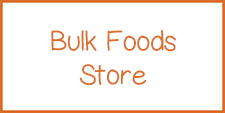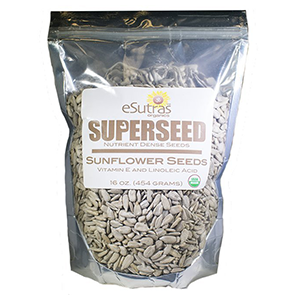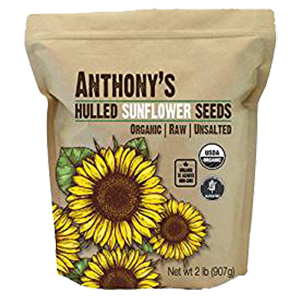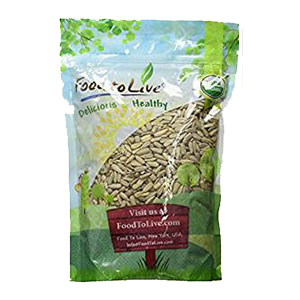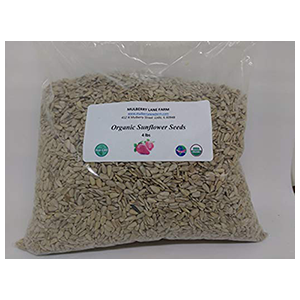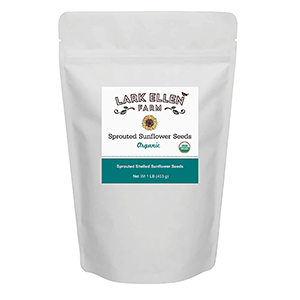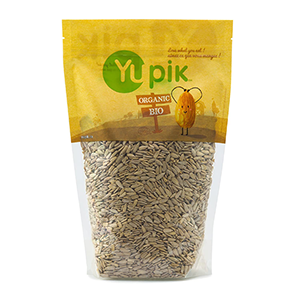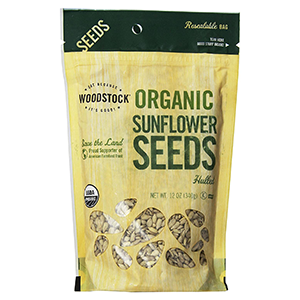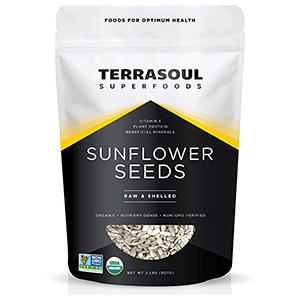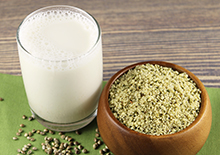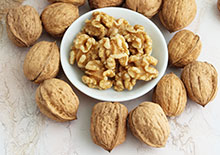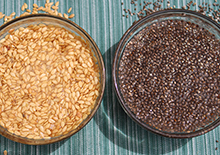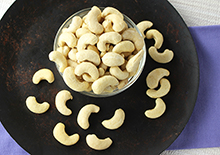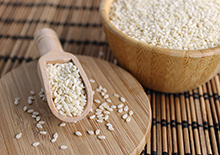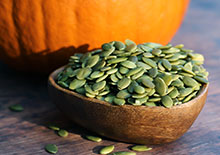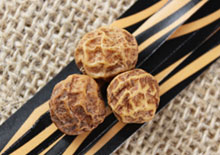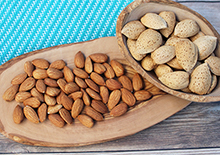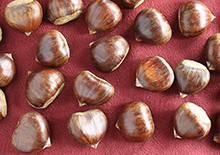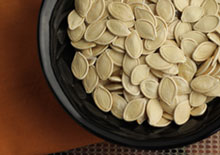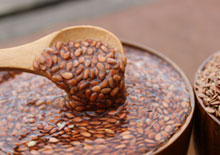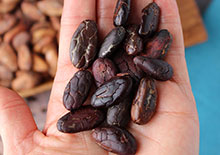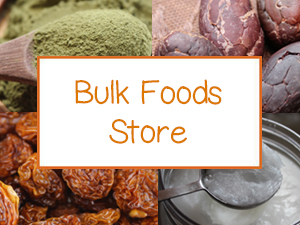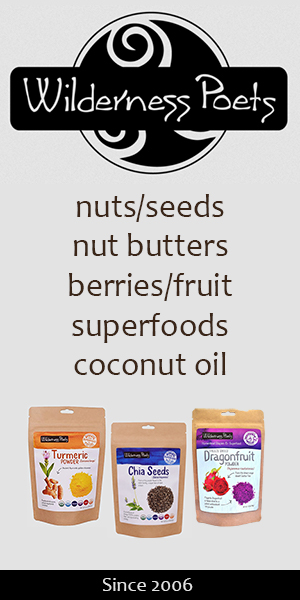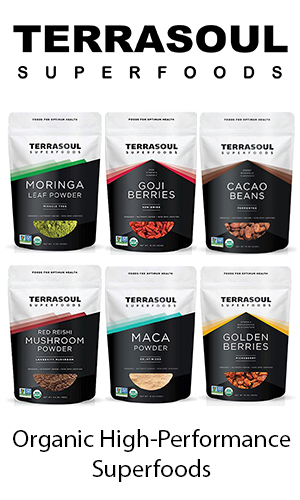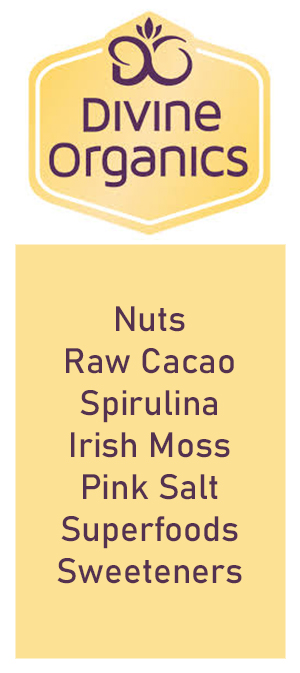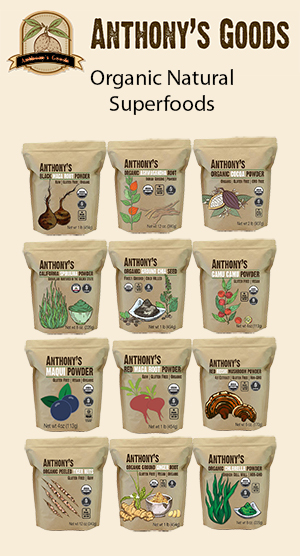- Home
- Nuts and Seeds
- Benefits of Sunflower Seeds
7 Health Benefits of Sunflower Seeds
Vitamin E | Selenium | Lecithin | Protein and Fat | Other Vitamins and Nutrients | Nut Allergies | Inexpensive | How to Use | Precautions | Shop
1) Benefits of Sunflower Seeds, Vitamin E
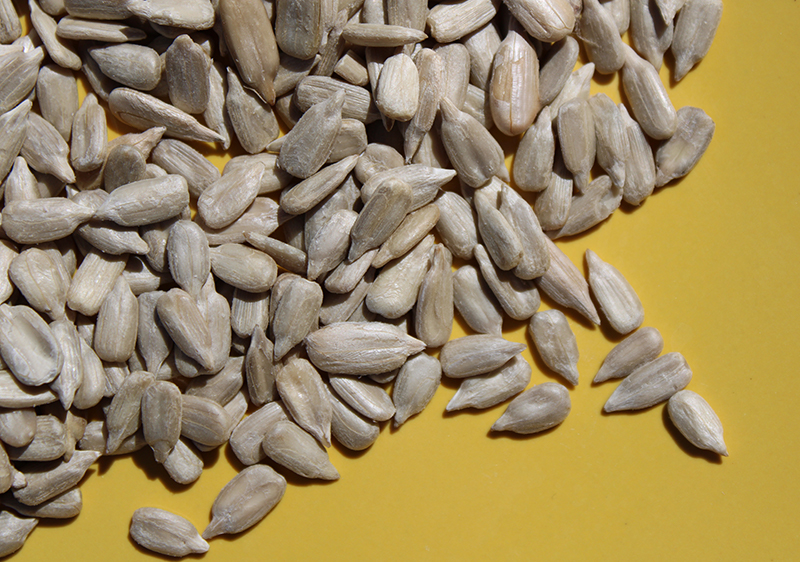
Sunflower seeds have the highest amount of Vitamin E out of all the nut and seed types. A one-ounce serving (about 3T of raw seeds) can offer an average of 47% of the daily recommended intake.
There is so much VITAMIN E in sunflower seeds that many vitamin E supplements are in fact sourced from sunflower oil, mostly in the form of α-tocopherol. Vitamin E is well-known for its skin healing benefits and is a supportive nutrient to the eyes, brain and nerve functions.
As a fat-soluble antioxidant, it helps to neutralize harmful free radicals. The sunflower plant itself likewise uses the vitamin E related tocochromanols to help protect seed longevity as well as prevent oxidization and rancidity.
2) Benefits of Sunflower Seeds, Selenium
Table of Contents
Vitamin E | Selenium | Lecithin | Protein and Fat | Other Vitamins and Nutrients | Nut Allergies | Inexpensive | How to Use | Precautions | Shop
Another essential nutrient that sunflower seeds are especially high in is SELENIUM. While not nearly as much as Brazil nuts, just 3 tablespoons can provide about 14.8 micrograms or 21% the Daily Value.
As many health seekers are aware, dietary selenium is crucial for proper thyroid function and the conversion of the thyroid hormone T4 (thyroxine) to the active T3 (triiodothyronine) hormone. Selenium also acts as an antioxidant in the body and supports glutathione production and DNA synthesis.

The Recommended Daily Intake for selenium is 55 mcg per day for adults. During pregnancy, this amount for women is 60 mcg a day and 70 mcg a day when lactating. (Source)
When making fermented seed cheese, sunflower seeds are a top variety utilized by many vegan chefs. The soaking and fermentation process helps to remove phytate inhibitors and predigests the seeds, making nutrients like selenium more bioavailable to digestion.
In some research, it was shown that fermenting, soaking and sprouting seeds can increase nutritional quality by removing some of this phytic acid content.
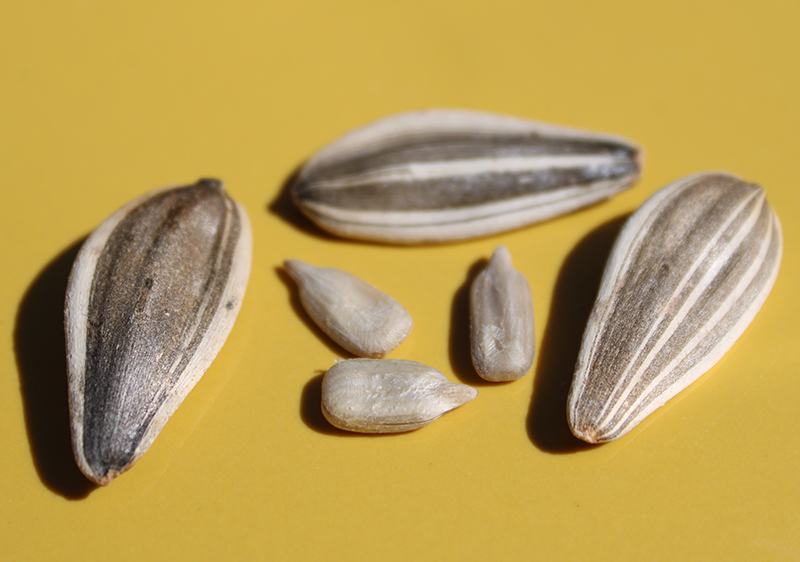
3) Benefits of Sunflower Seeds, Lecithin
Sunflower seeds are one of the top plant foods, along with soybeans, that contain the yellow-brownish fatty substance known as LECITHIN.
Some commercial lecithin powders or granules used as dietary supplements and emulsifying agents are often derived from sunflower seeds. (Source)
Usually, this is as a non-GMO vegetable lecithin alternative to soy or rapeseed, which is shown to contain similar phosphatide composition.
Lecithin is a source of phosphatidylcholines or CHOLINE, an essential nutrient for proper brain function and is the precursor to cell membrane formation, the neurotransmitter acetylcholine and trimethylglycine betaine. Both lecithin-derived choline and betaine are identified in USDA sunflower seed nutrition data.
4) Benefits of Sunflower Seeds, Protein and Fat
Sunflower seeds are actually the third highest in protein content next to hemp seeds and pepitas. They are about the same protein range as pistachios and almonds, with one ounce averaging 5.8 grams PROTEIN or 12% the daily value for adults based on a 2,000 calorie diet.
Nuts and seeds are sometimes called "protein-fats" because they're usually more fat than protein. Composed of about 164 calories an ounce according to some nutrition data, 121 calories are from fat and 20.3 calories is from protein with the remaining 22.7 from carbs, mostly in the form of dietary fiber.
One Ounce Sunflower Seeds:
- Calories - 164
- Fat - 121 (507 kJ)
- Protein - 20.3 (84.6 kJ)
- Carbohydrates - 22.7 (95.0 kJ)
The sunflower species (Helianthus annuus) is native to temperate regions of North America and Mexico. In several Native American traditions, the seeded sunflower plant was grown and used as a nutritious food and oil source, sometimes called the "fourth sister" to their three sister staple foods beans, corn and squash.
5) Benefits of Sunflower Seeds, Other Vitamins and Nutrients
Sunflower seeds are an excellent source of many B-complex vitamins such as thiamine, vitamin B6, folate and niacin. The top minerals include manganese, copper, magnesium, selenium, phosphorus and zinc.
The seeds also contain higher phytosterols, like β-sitosterol, in comparison to other nuts and seeds. These are substances commonly associated with an LDL cholesterol-lowering influence. (*)
In research analyzing highly refined sunflower oil using RBD techniques, both phytosterols and other triterpenoids such as squalene were significantly diminished.
Therefore, if you're going to use sunflower oil occasionally, we would recommend the unrefined cold-pressed for non-heat applications or less refined expeller-pressed varieties for low-temp sautéing.
SUNFLOWER SEEDS - One Ounce (3T)
Protein - 5.8g, 12%
Fat - 14.4g, 22%
Carbohydrates - 5.6g, 2%
Fiber - 2.4g, 10%
Calories - 164 (687 kJ), 8%
Calcium - 21.8mg, 2%
Iron - 1.5mg, 8%
Magnesium - 91.0mg, 23%
Phosphorus - 185mg, 18%
Potassium - 181mg, 5%
Sodium - 2.5mg, 0%
Zinc - 1.4mg, 9%
Copper - 0.5mg, 25%
Manganese - 0.5mg, 27%
Selenium - 14.8mcg, 21%
Vitamin E (α-Tocopherol) - 9.3mg, 47%
Vitamin K - 0.0mcg, 0%
Thiamin - 0.4mg, 28%
Riboflavin - 0.1mg, 6%
Niacin - 2.3mg, 12%
Vitamin B6 - 0.4mg, 19%
Folate - 63.6mcg, 16%
Pantothenic Acid - 0.3mg, 3%
6) Health Benefits of Sunflower Seeds, Nut Allergies
For those with nut allergies, sunflower seeds can make a good alternative as they are less frequently known to cause food sensitivities.
You can also purchase sunflower seed butter for use as an almond or peanut butter replacement. Sometimes great for children who can't tolerate nuts.
For extreme nut allergies, it is always a good idea to make sure your sunflower seed products have been processed in a nut-free facility.
7) Health Benefits of Sunflower Seeds, Inexpensive Variety
Nuts and seeds these days can be quite costly compared to just a decade ago. However, sunflower seeds are probably one of the most inexpensive varieties to stock up on and keep in your emergency food supply. Each sunflower head can produce between 1500-2000 seeds which are relatively easy to harvest. This may explain their lower cost per pound compared to other seed choices.
Despite the fact that Russia and Ukraine, as of 2021/2022, were the two top export suppliers of sunflower seeds and especially sunflower oil, there are still enough producers worldwide to move into potential openings in the marketplace.
In North America, sunflower seeds are grown in the U.S. and Canada but are also imported. The main organic online brands we researched get their seeds from Romania, Bulgaria, Turkey and China.
How to Use
For highest nutritional value, we feel it is best to eat raw unsalted sunflower seeds or consider soaking and dehydrating the seeds with seasonings for a crunchy snack-like food.
Again, they make a great base for seed cheese, can be sprinkled on salads, added to granola recipes or when making trail mix.
Precautions:
Consult your nutritionist, dietitian or healthcare advisor before consuming sunflower seeds on a regular basis if you are pregnant, nursing, taking prescribed medications or have a serious medical condition.
Shop Related Products (About Affiliates & Amazon Associate Paid Links)
Affiliate Disclaimer: This section contains affiliate product links. If you make a purchase through our recommended links, we receive a small commission at no additional cost to you. Thanks for the support.
